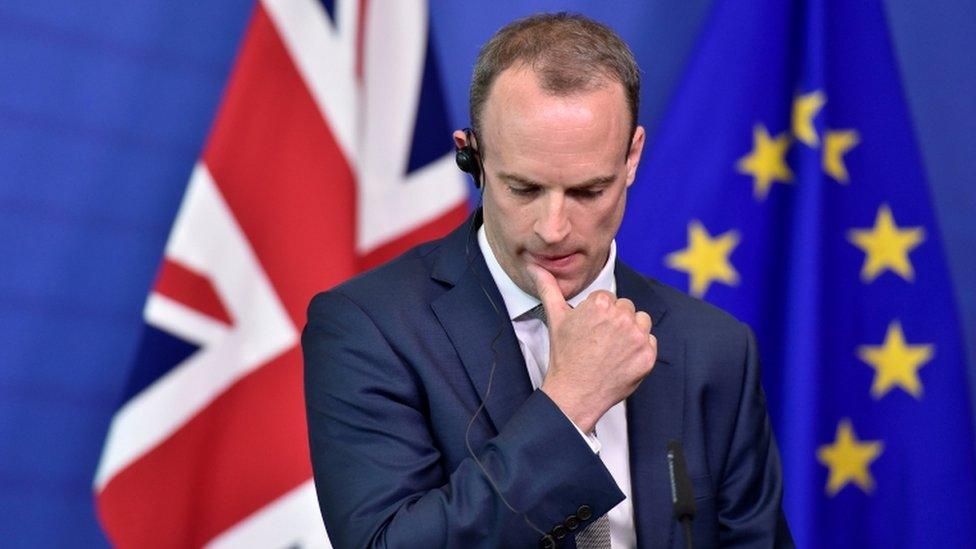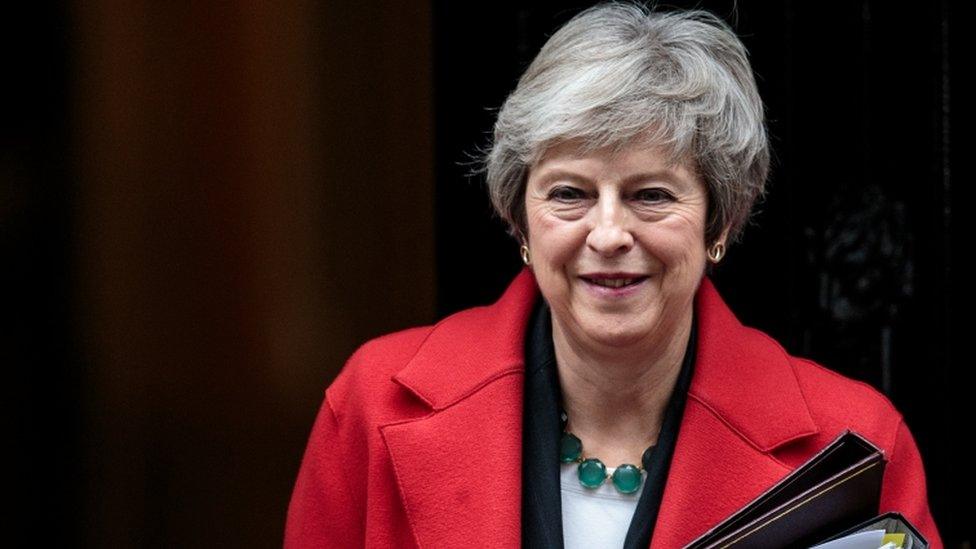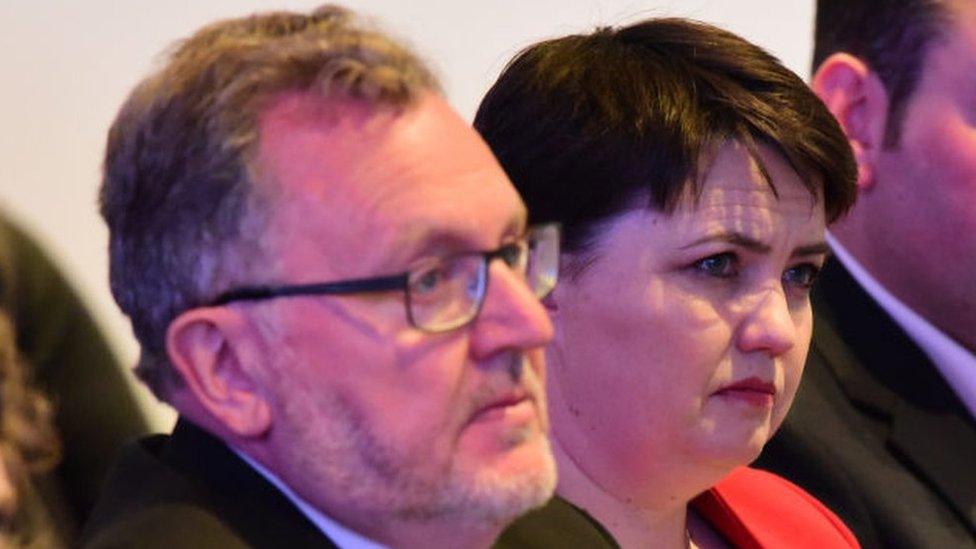Brexit: Scottish Tory MP urges Mundell to quit over EU agreement
- Published
- comments
David Mundell says he is staying as Scottish Secretary
The Scottish secretary has been urged to quit by one of his own colleagues over the draft Brexit deal.
In a WhatsApp message to David Mundell, Scottish Conservative MP Ross Thomson said "no Unionist" could support the proposals.
Mr Thomson said he was asking Mr Mundell "in the gentlest and strongest terms" to follow Brexit secretary Dominic Raab in quitting the cabinet.
Mr Mundell has told BBC Scotland he has no intention of standing down.
He has publicly backed the draft agreement, saying he was doing so on the basis that a no-deal Brexit would be "appalling" for Scotland, and urged his fellow Conservative MPS to support the prime minister.
Mr Mundell has also launched a broadside against the ministers who have resigned - including Mr Raab.
He said: "As someone who has stood steadfastly for keeping Scotland in the United Kingdom, I am not going to take lectures from latter-day Unionists who are now using it as merely a hook on which to hang their resignations.
"The Union is far more important than people's political careers. That is why I am focused on Scotland remaining in the United Kingdom and the best way for that to happen is to ensure that we have an orderly Brexit across the whole of the United Kingdom."

Dominic Raab's resignation is a significant blow for the prime minister
Mr Raab's resignation, along with those of four others including Work and Pensions Secretary Esther McVey and junior Northern Ireland minister Shailesh Vara, is a major blow for the prime minister, who announced on Wednesday evening that her cabinet had agreed the 585-page EU withdrawal document.
Mr Raab backed Leave in the Brexit referendum and was closely involved in drafting the agreement, which sets out the terms of Britain's departure from the EU.
In his resignation letter, he said the deal represented a "very real threat to the integrity of the United Kingdom" because of special provisions for Northern Ireland.
He also said he could not accept "an indefinite backstop arrangement" for the Irish border.
Allow X content?
This article contains content provided by X. We ask for your permission before anything is loaded, as they may be using cookies and other technologies. You may want to read X’s cookie policy, external and privacy policy, external before accepting. To view this content choose ‘accept and continue’.
In his WhatsApp message to Mr Mundell, which has been seen by BBC Scotland, Mr Thomson said the backstop arrangements "mean a separate regulatory regime in Northern Ireland and that they will be more closely aligned with the EU than the UK".
Mr Thomson, a prominent Brexiteer who has been highly critical of the prime minister's approach, added: "We have already seen the SNP leaping on this calling for a differential deal in Scotland.
"This arrangement, I feel, is something no Unionist can support. Given that two members of the cabinet have resigned on the basis that the proposals put at risk our Union I want to urge you in the gentlest and strongest terms to follow suit."
'Incredible job'
Mr Thomson also stressed that he believes Mr Mundell is a "great Secretary of State" who is doing an "incredible job", and said he would "support you in whatever you decide".
Mr Mundell and Scottish Conservative leader Ruth Davidson warned Mrs May last month that they could not back any deal that "delivers a differentiated settlement for Northern Ireland", fearing it would be a political gift to the SNP and could fuel the case for Scottish independence.
The Scottish government has argued that the deal would effectively allow Northern Ireland to remain in the single market while Scotland has to leave - giving it a competitive advantage that would be "devastating" for Scottish jobs and investment.
It has said it will hold a symbolic vote on the proposals in the Scottish Parliament before a vote takes place in the House of Commons.
The Scottish and Welsh governments have also asked the UK government for face-to-face talks over the agreement next week.

The prime minister gave a statement on the draft agreement to the House of Commons on Thursday mornig
First Minister Nicola Sturgeon told Holyrood that Mr Mundell and Ms Davidson would both now resign if they had any "backbone", and reiterated that the 35 SNP MPs at Westminster would vote against the deal.
Scottish Labour MP Ian Murray said it was now clear that the Conservatives "are as big a threat to the integrity of the UK as the SNP".
He added: "This Brexit deal has zero chance of getting through parliament and it is now imperative that the prime minister offers the public a People's Vote with the option of remaining in the EU."
There are major doubts over whether Mrs May can convince enough MPs in the House of Commons to support her Brexit plan, and there have been suggestions some Tory MPs could try to force a no-confidence vote.
'National interest'
Mrs May told the Commons on Thursday morning that, as prime minister of the United Kingdom, she has a "responsibility to people in every part of our country and I intend to honour that promise".
And she described the draft deal as a "decisive breakthrough" in the Brexit negotiations as she urged MPs to "consider the national interest and give it their backing".
Mrs May warned: "Voting against a deal would take us all back to square one. It would mean more uncertainty, more division, and a failure to deliver on the decision of the British people that we should leave the EU.
"If we get behind a deal, we can bring our country back together and seize the opportunities that lie ahead."

Why is David Mundell not resigning?
Analysis by Sarah Smith, Scotland correspondent

Sources told the BBC earlier this year that Mr Mundell and Scottish Conservative leader Ruth Davidson would resign if Northern Ireland was given a different deal to the rest of the UK
Given that Ms Davidson and Mr Mundell effectively threatened to resign over any deal that introduces different arrangements for Northern Ireland why are they not now considering their positions?
Last night Mr Mundell seemed to interpret the deal rather differently from some of his cabinet colleagues, saying: "I was content to move to the next stage... on the basis that arrangements for Northern Ireland will not undermine the economic or constitutional integrity of the UK."
How does he square that with the warnings from Mr Raab and Ms McVey that the deal threatens the integrity of the UK?
Other members of the Scottish Conservative parliamentary team say they want more clarification from the PM on the Union and on future arrangements for the control of UK fishing rights. But many are likely to back the deal.
The SNP have consistently argued they want Scotland to remain a member of the EU single market and customs union even if the rest of the UK leaves.
The UK government maintains it would not be possible to have different arrangements for Scotland while it remains part of the UK.
The worry from Scottish unionists is that allowing a separate regulatory regime for Northern Ireland undercuts that argument and allows the SNP to demand separate arrangements for Scotland.

Speaking to the BBC's Good Morning Scotland programme on Thursday, the Scottish government's Brexit secretary, Mike Russell, said the prime minister was "in a mess of her own making".
And he insisted the choice facing the country was not between "Mrs May's way or no deal at all".
He said voting down the Brexit agreement in the House of Commons would give the government 28 days to come back with a set of alternative proposals.
These could include renegotiation, single market and customs union membership, staying in the EU, a general election or a second referendum on the Brexit terms.
Mr Russell said he believed the option of remaining in the EU - which the PM herself mentioned in a statement outside Downing Street after her cabinet meeting - was still "on the table".
